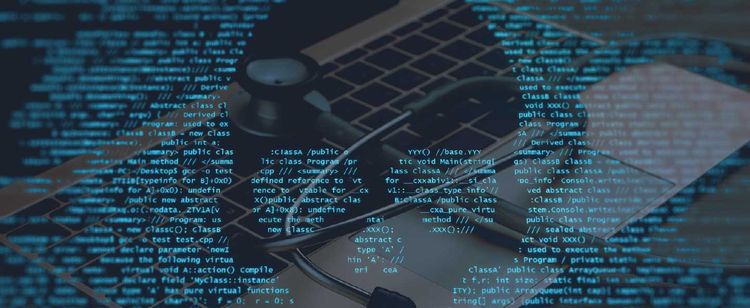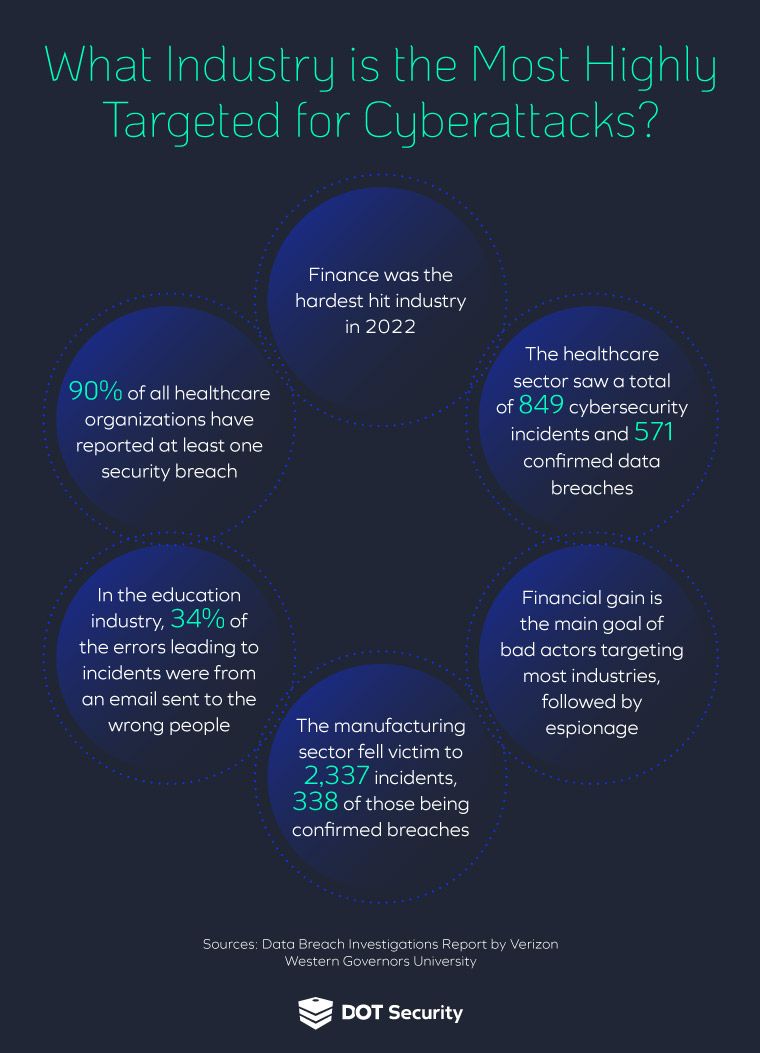Compliance Services
The Industries That Need Cybersecurity the Most
November 01, 2022
7 Minutes

Due to the high amount of confirmed incidents and network breaches, finance, healthcare, professional services, and public administration are some of the industries that need cybersecurity the most.
These fields face more cybercrime due to the type of data they handle. Financial data, customers’ personal data, and health information can go for higher prices online than other types of files. It’s no wonder why malicious actors often target organizations in these fields.
Sign up for our newsletter!
In order to attain business longevity, protect sensitive data, and provide outstanding customer service, organizations need to develop a cybersecurity plan. Yet this plan wouldn’t be complete without strategies to safeguard all layers of your network and rules to ensure your company is compliant with data protection laws and requirements.
Organizations in the healthcare industry must ensure HIPAA compliance. To learn how, check out our Checklist: What are the HIPAA Safeguards for Compliance?
Let’s discuss which industries are highly targeted for cyberattacks, why they need extra cybersecurity, and why data protection is so important.
Which Industry is the Most Highly Targeted for Cyberattacks?
The effects of the COVID-19 pandemic are still being felt, especially in regard to cybersecurity. Cybercrime has increased 300% since the lockdown, according to the FBI.
Malicious actors target all types of businesses and industries. However, a few industries are more likely to be victims of cybercriminal activity. These include finance (2,527 incidents), professional services (3,566 incidents), healthcare (849 incidents), public administration (2,792 incidents), information (2,561 incidents), and education (1,241 incidents).

Within these industries, small and mid-size businesses are two to four times more likely to be the victim of a data breach.
However, there is more to cybersecurity than installing an antivirus program and using good password hygiene. In order to protect your network, an organization needs a thorough program that includes compliance protocols.
Industries that Need Cybersecurity Compliance
Industries that are required to follow laws and regulations such as HIPAA and CMMC should draft a cybersecurity program that includes compliance with them. Generally, the industries that fall under this category are healthcare, manufacturing—especially aerospace manufacturers who wish to work with the Department of Industry—and education.
However, compliance affects businesses outside of these industries too. For example, CCPA and GDPR are laws created to protect consumers’ personal information. If your customers are located in California or the EU, respectively, these compliance laws will apply to you.
Healthcare Compliance: HIPAA
If you work in the healthcare industry, you are likely familiar with the HIPAA (Health Insurance Portability and Accountability Act). The HIPAA privacy rule is a federal law that protects patients’ medical records and their personally identifiable health data.
Organizations that must adhere to HIPAA regulations include healthcare providers, insurance companies, health maintenance organizations (HMOs), and legal companies handling a patient’s health data. In short, any organization that manages a patient’s protected health information (PHI) needs to follow HIPAA standards.
PHI: It stands for protected health information. PHI is information, including demographic information, relating to an individual’s physical or mental health or condition, the provision of health care to the individual, and payment for the provision of health of the individual.
For example, laboratory tests, medication lists, visit discharge summaries, or hospital bills are all considered PHI because they include an individual’s personal health information.
Healthcare organizations and other companies handling PHI should note that HIPAA compliance does not only cover paper and electronic patient records. A patient’s medical information disseminated orally, in recording, or through text, should also follow HIPAA regulations.
For instance, a conversation or email discussing a patient’s personal health information shared with a third party not involved in the care of the patient or payment process—whether accidentally or by design—would be a violation of HIPAA.
HIPAA violations result in fines—starting at $100 for accidental violations that could not have been avoided to $50K or more for violations done through willful negligence without a correction attempt.
Sharing a patient’s information on social media or willingly selling their records to a pharmaceutical sales representative, for example, constitute HIPAA violations.
Intentional misuse of individually identifiable health information is a serious offense and will be investigated by the Department of Justice. Besides fines, these violations can result in jail time.
Related Blog: What are the Consequences of a HIPAA Violation?
Aerospace & Defense Industry Regulations: CMMC
CMMC stands for Cybersecurity Maturity Model Certification. The CMMC is a compliance program developed by the US Department of Defense outlining requirements for contractors in the defense industrial base (DIB). The program is meant to safeguard federal contract information (FCI) and controlled unclassified information (CUI).
FCI: It stands for federal contract information. It’s information not intended for public release, provided by or generated for the government under a contract to develop or deliver a product or service to the government.
Contract process documentation or emails exchanged with the DoD, for example, are considered FCI.
CUI: It stands for controlled unclassified information. It’s government-created or owned information that is not classified but which should be protected. CUI requires certain managing and dissemination controls to diminish vulnerabilities.
Examples of CUI include engineering data or contract details relating to business dealings with the government.
The Department of Defense released the CMMC 2.0 model in November of 2021. However, the DoD announced that it expects to issue final regulations by March of 2023. So CMMC requirements could appear in solicitations and contracts as early as the spring of 2023.

Adhering to CMMC regulations is not only crucial to protect sensitive data, but also to ensure national security.
Take as an example the cybercriminal operation dubbed TA2541, launched by an unknown hacking group, which has been targeting the aerospace, transportation, defense, and manufacturing industries since 2017. It has compromised companies in North America and abroad.
With so many risks, it is no wonder that companies who wish to earn a contract with the DoD and uphold security should follow CMMC requirements.
Related Blog: A Rundown of CMMC Aerospace Industry Regulations
Lack of adherence to HIPAA and CMMC regulations can cause financial and reputational losses, as well as security risks for a company, its clients, and even national safety. Therefore, medical organizations and contractors working with the DoD are two of the industries that need cybersecurity the most.
Takeaways
- The industries that need cybersecurity the most include healthcare, finance, manufacturing, and government institutions. These industries have higher risks due to the types of data they handle.
- Compliance and adherence to data protection laws and regulations are an important part of any thorough cybersecurity program.
- HIPAA regulations affect not only healthcare providers, but also insurance companies, HMOs, and any institutions that handle a patient’s personal health data.
- CMMC is a program created in order to protect sensitive and classified government data. Any contractor wishing to receive a contract with the Department of Defense must comply with it.
- A lack of cybersecurity strategies in your organizations can lead to data theft, reputation loss, and compliance-related fines and lawsuits.
If you are an organizational leader, consider developing or enhancing your cybersecurity program with your IT and cyber team or a cybersecurity provider like DOT Security.
To learn more about HIPAA and what it takes to ensure your healthcare organization is compliant, download and review our helpful Checklist: What are the HIPAA Safeguards for Compliance?.
